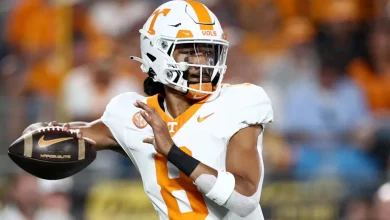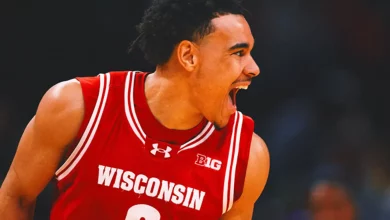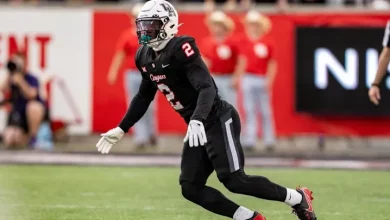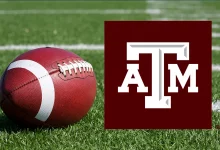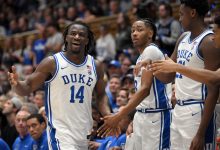Alabama’s greatest players and most iconic figures — Joe Willie Namath!
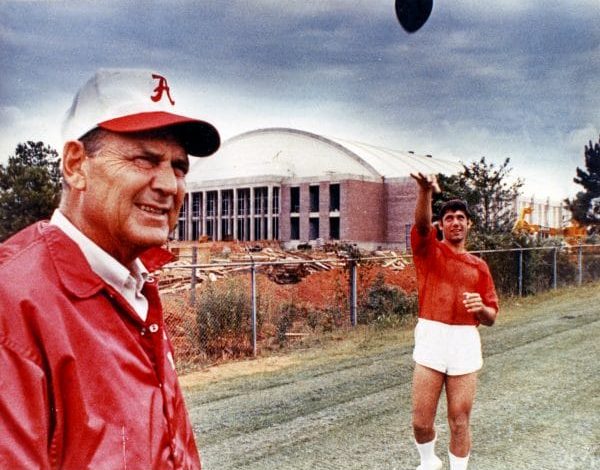
In the rich and unrivaled history of Alabama football, from the dynasties of Wallace Wade and Bear Bryant to the modern reign of Nick Saban, there have been countless legends. From dominant linemen to Heisman-winning quarterbacks, Crimson Tide greatness is defined by championships and tradition. But among all the stars to wear the crimson and white, one name still stands tallest in cultural impact, charisma, and lasting fame: Joe Willie Namath.
To understand Namath’s place in Alabama lore is to go beyond statistics and win-loss records. It requires stepping into a moment when college football met Hollywood flair, when deep Southern tradition collided with New York cool. Joe Namath wasn’t just a quarterback—he was a phenomenon. He redefined what it meant to be a sports star in America, and it all started in Tuscaloosa.
Even now, decades after he last wore an Alabama jersey or took a snap in the pros, Namath’s aura remains unmatched. He is more than a memory—he is a symbol of when Alabama football became national theater. His legend lives in sepia-toned photographs, film reels, and the hearts of fans who saw him elevate a team and a university with a smile, a wink, and a rifle of a right arm.
Born on May 31, 1943, in the working-class steel town of Beaver Falls, Pennsylvania, Namath was raised in a blue-collar family shaped by discipline and grit. His father, Janos “John” Namath, was a Hungarian immigrant who instilled in Joe a strong work ethic and love for sports. By the time he reached high school, Namath was already an athletic marvel—playing football, basketball, and baseball with effortless flair.
Though Major League Baseball scouts pursued him aggressively, Namath had other dreams. He wanted to play quarterback. And not just anywhere—he wanted to be part of something special.
In 1961, legendary Alabama coach Paul “Bear” Bryant traveled north and saw Namath throw. It didn’t take long for Bryant to realize what he was witnessing. The boy had a cannon for an arm, uncanny mobility, and that undefinable swagger. Namath was a natural-born leader with movie-star looks and a daredevil’s confidence.
Bryant offered him a scholarship on the spot, and Namath—against the wishes of MLB franchises offering significant money—chose Alabama. It would be a defining decision, for both of them.
The pairing of Namath and Bryant is the stuff of football folklore. Bryant, the stoic Southern icon, built on discipline, tradition, and control. Namath, the free-spirited Yankee with charisma to burn and a flair for improvisation. Yet the contrast worked beautifully.
When Namath arrived in Tuscaloosa in 1961, Alabama was already a powerhouse. But with Joe at quarterback by 1962, the offense took on a new dimension. His arm strength, accuracy, and ability to extend plays transformed the Tide into an offensive juggernaut.
Under Bryant’s watchful eye, Namath learned not just how to win—but how to lead. The coach famously said of his young quarterback, “He was the best I ever coached. He could throw a football through a car wash and not get it wet.”
Between 1962 and 1964, Namath led Alabama to a 29–4 record as a starter, including a national championship in 1964. He threw for over 2,700 yards in an era when passing was rare and often secondary. But it wasn’t the numbers that made Namath a legend—it was the way he did it.
Whether on the field or in the locker room, he exuded confidence. His teammates adored him. Bryant trusted him. Fans packed stadiums to watch him. In the South, Namath became a phenomenon—more Elvis than athlete.
The 1964 season remains one of the most celebrated in Alabama history. Namath, despite battling knee injuries, guided the Tide to a perfect 10–0 regular season and a national title (as awarded by the AP and UPI before the bowl games). Though Alabama lost to Texas in the Orange Bowl, Namath was electric in the defeat, throwing for 255 yards and two touchdowns against one of the nation’s best defenses.
It was during this time that Namath’s reputation expanded beyond college football. Sportswriters loved him. Photographers followed him. He wore white cleats, flashed a megawatt smile, and dated Hollywood starlets. He wasn’t just Alabama’s quarterback—he was college football’s first true celebrity quarterback.
The Bear loved him like a son. Years later, Bryant would say, “If there’s a better quarterback out there, I haven’t seen him.”
Namath left Alabama with his legend already in full bloom—but his stardom was only beginning.
Namath was drafted in 1965 by both the NFL’s St. Louis Cardinals and the AFL’s New York Jets. He chose the Jets, signing a then-record $427,000 contract—a staggering figure at the time. It shocked the football world and made him instantly famous.
In New York, Namath became Broadway Joe.
He wore fur coats, pantyhose in commercials, and sunglasses at night. He partied with celebrities, opened his own nightclub, and commanded headlines both for his performances and his persona.
But behind the flash was a fierce competitor—and a winner. In 1968, Namath led the Jets to the AFL Championship and a date with the mighty Baltimore Colts in Super Bowl III. The Jets were massive underdogs. Few gave them a chance.
And then Namath delivered his most famous line:
“We’re going to win Sunday. I guarantee it.”
The words were brash, bold, and unprecedented. And then, he backed them up. On January 12, 1969, Joe Namath led the Jets to a 16–7 upset win over the Colts. He didn’t throw a touchdown, but he controlled the game, outmaneuvered a Hall of Fame defense, and delivered the win that gave the AFL legitimacy—and cemented his legacy.
That single moment, the guarantee and the victory, changed football forever. It helped bring about the AFL-NFL merger and made Namath an icon—not just in New York, but across America.
Though injuries shortened his prime and limited his stats, Namath’s impact far exceeds the box score. He played 13 seasons in professional football, throwing for over 27,000 yards and 173 touchdowns. He was elected to the Pro Football Hall of Fame in 1985.
But it’s his cultural footprint that defines his legacy.
Namath was the first modern quarterback—the prototype for what would become the NFL superstar. He had style, substance, swagger, and success. Every brash, charismatic QB that came after—whether Brett Favre, Cam Newton, Patrick Mahomes, or Aaron Rodgers—owes a debt to Broadway Joe.
For Alabama fans, his name remains magic. He embodied everything the program has come to represent: excellence, confidence, flair, and fearlessness. While others won more titles, no one ever defined Alabama football on the national stage quite like Namath did.
In a program filled with champions—Stabler, Ingram, Derrick Henry, Tua, Bryce Young—Joe Namath still stands as the most iconic.
Namath never forgot where he came from. Despite his New York stardom and Hollywood lifestyle, he always remained close with the Alabama community and Coach Bryant.
In fact, Namath often credited Bryant with saving his life.
“I was headed down a wrong path when I got to Alabama,” Namath once said. “Coach Bryant believed in me. He gave me structure. He made me a man. I owe him everything.”
Namath returned to Tuscaloosa regularly, supported the program during lean years, and was visible during the Saban dynasty. He watched as the program he helped launch into national consciousness evolved into the most dominant force in college football history.
At every turn, Namath has been Alabama’s ambassador—a reminder that before the statues, the crystal footballs, and the Nick Saban empire, there was a kid from Beaver Falls who put on the crimson jersey and made the nation watch.
What makes Joe Namath Alabama’s most iconic figure isn’t just his achievements. It’s the feeling he generated—then and now.
When you say the name “Namath,” people light up. It evokes style, confidence, charisma, and big-stage brilliance. For many, especially older fans, Namath was the first Alabama player who didn’t just win—he entertained. He made football fun.
You could argue others were more dominant. Derrick Thomas terrified quarterbacks. Mark Ingram and DeVonta Smith won Heismans. Bryce Young threw with surgical precision. But Namath transcended the game. He became a national figure, a trailblazer, and a symbol of the swagger that Alabama football still carries today.
In that way, Joe Willie Namath isn’t just a football legend.
He’s a cultural icon. The original star. Alabama’s golden arm.




